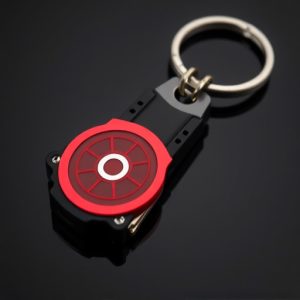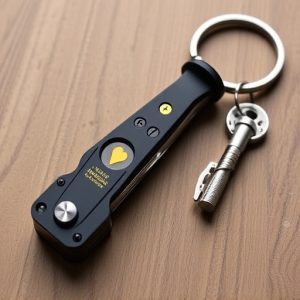Self-Defense Keychains for Runners: Legal Requirements and Safety Features
For runners seeking personal safety, self-defense keychains offer a convenient protection tool, but…….
For runners seeking personal safety, self-defense keychains offer a convenient protection tool, but navigating legal implications is vital. Local laws regarding defensive devices vary globally, dictating device type, power, and carrying circumstances to ensure legality and avoid issues during outdoor activities. Popular among runners, these keychains are subject to age restrictions and must comply with certifications from reputable manufacturers for ethical usage and enhanced security. Prioritize safety over aesthetics when choosing a keychain with reliable activation mechanisms to deter attackers and aid in emergencies.
“Ensuring safety while running is paramount, especially with the rise of self-defense keychains as a popular choice for runners seeking protection. This article navigates the legal landscape surrounding these compact defense devices, offering insights into crucial considerations. We explore local laws and regulations, the influence of concealed carry laws, age restrictions, and essential safety features to ensure compliance. Understanding your rights and responsibilities is vital when considering a self-defense keychain for runners, as it can vary significantly from one jurisdiction to another.”
- Understanding Self-Defense Keychains for Runners: A Legal Perspective
- Local Laws and Regulations: Where You Live Matters
- The Impact of Concealed Carry Laws on Keychain Devices
- Age Restrictions: Who Can Own and Carry?
- Safety Features to Look For in Legal Compliance
Understanding Self-Defense Keychains for Runners: A Legal Perspective
For runners, self-defense keychains offer a convenient and accessible tool to enhance personal safety while on their daily jogs or during outdoor activities. These compact devices are designed to provide a sense of security by allowing users to protect themselves in various scenarios, especially when alone in remote areas. However, understanding the legal implications surrounding self-defense keychain use is essential for runners to ensure they remain within regulatory boundaries.
From a legal perspective, self-defense keychains are typically evaluated under specific laws related to defense against aggression or threats. The key considerations include the jurisdiction’s definition of reasonable force and the circumstances in which using such a device would be considered legal self-defense. Some regions may have strict guidelines on personal protection devices, including limitations on the type of force they can deploy. Runners should also be aware of local laws regarding open carry of self-defense tools like keychains to avoid any potential legal issues during their outdoor activities.
Local Laws and Regulations: Where You Live Matters
Local Laws and Regulations play a significant role in determining the legal status of self-defense keychain devices, especially for runners or individuals who engage in outdoor activities. Depending on where you live, there may be specific regulations governing the carrying of personal defense tools, including keychains designed for self-protection. Some regions have stricter laws, prohibiting any form of self-defense device, while others might allow certain types under specific conditions.
For instance, a Self Defense Keychain for Runners could be considered legal in areas that permit defensive tools for personal safety, but it’s crucial to understand the local rules. These regulations often cover factors like the type of device, its capacity or power, and the circumstances under which it can be carried. Being aware of these laws is essential to ensure compliance and avoid any potential legal issues while enjoying outdoor activities like running.
The Impact of Concealed Carry Laws on Keychain Devices
With the increasing popularity of self-defense keychain for runners and other personal safety devices, understanding the legal landscape is crucial. In many regions, concealed carry laws have significantly influenced the availability and use of such compact defense tools. These laws vary widely across states and countries, dictating where and how individuals can carry hidden weapons or self-defense devices like keychains. For instance, some jurisdictions allow licensed individuals to conceal carry handguns, while others may have restrictions on certain types of self-defense equipment due to safety concerns or political sentiments.
For manufacturers and users of self-defense keychains, navigating these legal requirements is essential. Compliance ensures that their products remain accessible to those seeking extra protection during their daily routines, including running. Staying informed about local concealed carry regulations can help promote the responsible use of such devices, enhancing personal safety without compromising legal boundaries.
Age Restrictions: Who Can Own and Carry?
In many jurisdictions, the legal status of self-defense keychain devices, particularly those designed for runners, is subject to age restrictions. The minimum age requirement varies across regions but often limits ownership and carrying to individuals who have reached a certain maturity level. This restriction aims to ensure responsible use and prevent the device from falling into the hands of minors who might not fully comprehend its purpose or handle it with the necessary caution.
Understanding these legal constraints is crucial for runners considering self-defense keychains as a safety measure. It’s essential to check local laws to verify if there are any restrictions based on age before purchasing such devices. This responsibility not only ensures compliance but also guarantees that individuals using these tools do so legally and ethically, enhancing their overall security while running or engaging in outdoor activities.
Safety Features to Look For in Legal Compliance
When considering a self-defense keychain for runners, it’s crucial to look beyond its appealing design and focus on essential safety features that meet legal requirements. Firstly, ensure the device is designed with a reliable activation mechanism, allowing users to quickly defend themselves in emergencies. Look for keychains equipped with sharp blades or high-intensity lights that can deter attackers and provide a temporary escape route during runs.
Additionally, check for certifications indicating compliance with local self-defense tools legislation. Some regions have specific laws governing the carry and functionality of personal defense items. A reputable manufacturer will ensure their products adhere to these standards, offering peace of mind while running in unfamiliar or potentially dangerous areas.
When considering a self-defense keychain for runners, understanding local legal requirements is essential. Different regions have varying regulations regarding concealed carry and age restrictions, impacting your ability to legally protect yourself. Always check local laws before purchasing a keychain device, ensuring it complies with safety standards and legal constraints. By doing so, you can make an informed decision, choosing a self-defense keychain that offers both peace of mind and legal protection while you’re on your runs.


